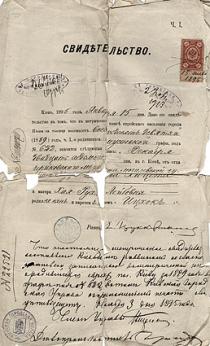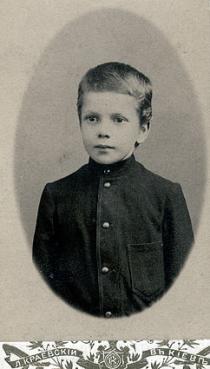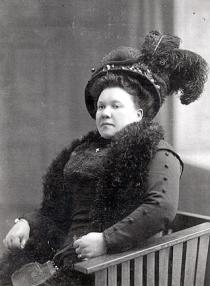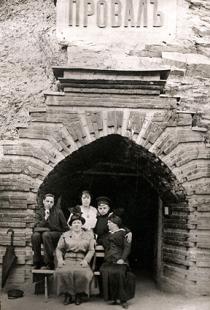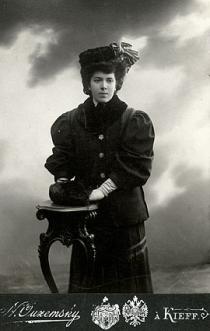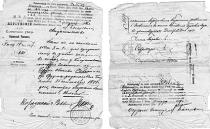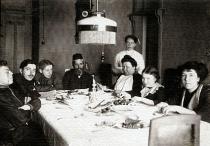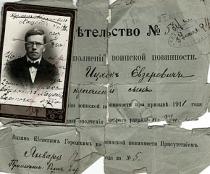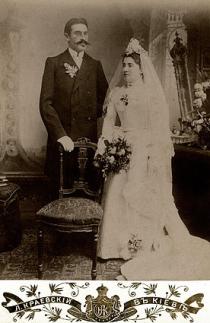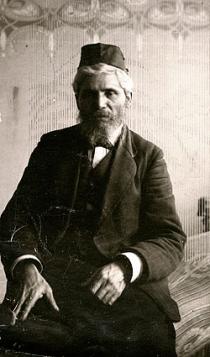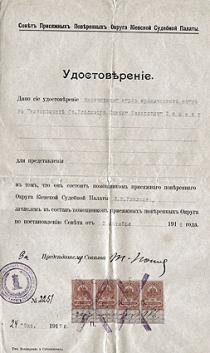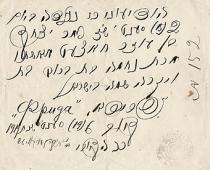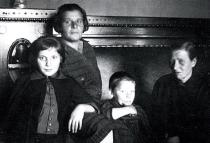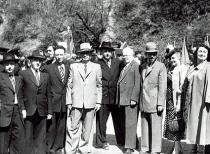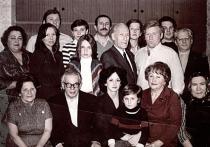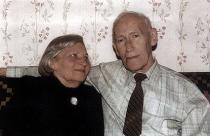The family of my father Itshok Khatset having a festive dinner. From left to right: my father Itshok Khatset, my father's brothers Gersh Khatset and Boris Khatset, grandfather Evzer Khatset, grandmother Haya Rukhlia Khatset, my father's sisters Vera Khatset and Manya (I don't remember her last name in marriage), standing: housemaid. They were photographed by Manya's husband Samoilik (I don't remember his last name). Kiev, 1909.
The name of my grandfather on my father's side was Evzer Khatset. I guess my grandfather Evzer was born in 1850s. I don't know where he was born. Perhaps, he came from Kiev. The thing is when we were young it was not a custom in our family to share the memories or ask questions about the past. My grandfather was a merchant of guild 2. He was a leather dealer. I remember how my grandfather looked: he wore a black yarmulka, had a small beard with streaks of gray and a moustache, and he was a slender man. My grandmother Haya Rukhlia Khatset - I don't know her maiden name - was born in 1860s. I don't know where she was born. My grandmother and grandfather lived in the center of Kiev.
My grandmother and grandfather were deeply religious: my grandfather had a Torah and there was a mezuzah over their door: a box with a scroll with a prayer written on it. My grandfather had a black and cream striped tallit and a leather tefillin: two small boxes with long leather straps to be worn on the forehead and hands. My grandfather strictly observed Jewish traditions and went to the synagogue as long as his condition allowed. I remember that my mother and I went to my grandmother and grandfather when they were old and ill. I felt bored when she was taking care of them. Their apartment seemed very big to me: a big hallway, a dining room with high windows and several other rooms.
My grandmother and grandfather had five children: the oldest girl Dunia was born in the end of 1870s. She marry a Jew, I don't remember her last name after she got married, but I know that she and her husband had a small house in Irpen near Kiev. Dunia was a housewife. I don't think they had children. When we returned from evacuation in 1944 my father went to Irpen looking for Dunia. Her neighbors told him that in autumn 1941 Germans took Dunia and her husband to Babi Yar where they perished.
Manya, the second daughter, was born in 1880. She graduated from the conservatory in Kiev and met her future husband there, he was a Jew. Manya took her husband's last name, but I don't remember it. I only remember that her husband's name was Samoilik, he worked as a foreman at a construction site in Moscow. Manya went to live with him after they got married. Manya's husband provided well for his family. She was a housewife. During the Great patriotic war they stayed in Moscow. We didn't see each other after the war. They only wrote letters occasionally. Manya died from cancer in Moscow in 1950s and uncle Samoilik lived few years longer.
The next was Gersh Khatset - he was the oldest brother. He was born around 1883. I don't know whether he went to cheder. Gersh finished Commercial school in Kiev where they had advanced studies in commercial mathematics, commercial correspondence, commercial geography and accounting. Gersh received special secondary education in this school and entered Kiev Industrial College. Upon graduation from there he became a leather specialist. However, he couldn't find a job according to his specialty and worked as an accountant. He was shortsighted and like my father, was not subject to military service. His wife Nina was Christian and Gersh was baptized too. My grandfather and grandmother were not happy about their son marrying a Christian girl and Gersh's baptistery was a hard blow for them. But they could only but accept what happened. Gersh kept in touch with his parents, but they remained cold and polite with him and his wife, although they didn't mind them visiting. Gersh's or our family weren't religious and we never touched upon any religious subjects.
The next child in the family was my father Itshok Khatset, born in 1889. Like Gersh he studied at Commercial School in Kiev and finished it with a gold medal [highest award for graduates of secondary schools in the Tsarist Russia and after in former USSR] in 1906. To enter the University he had to pass exams for a course of studies in grammar school. My mother told me that my father's dream was to become a doctor and he submitted documents to Medical Faculty, but was not admitted due to the 5% restriction for admission of Jews. He studied at the Faculty of Mathematics and Physics for a year and then went to study at the Medical Faculty, but left it. He spent a lot of time studying philosophy and literature and he decided that he had to refuse from becoming a doctor since he would experience the feeling of guilt every time he fails to cure a patient and every fatality would be painful for him. My father went to study at the Law Faculty believing that he would be helping people after getting this profession. He was a very sociable, kind and educated man and very intelligent person.
My father's younger brother Boris was born in 1890s. Like Gersh he graduated from the Institute of Light Industry in Kiev and became chief engineer at the leather factory in Viatka. He was married to a Jewish woman and they had a son - Karik.
My father's younger sister Vera Khatset was born in 1902. After the secondary school she graduated from Chemical Faculty of Kiev University and followed Manya to Moscow. Vera was single and had no children. She was a chemist and died in Moscow in 1970s. We didn't keep in touch.
Before the Revolution of 1917, the Khatset family was wealthy: they could afford to take a vacation at the seashore in the Crimea or Caucasus. When the children grew up they didn't make my grandmother happy: my father married a poor girl, Gersh got baptized that was even worse and Boris divorced his wife, although it was not his fault. I know that my grandfather and grandmother didn't want my father to marry my mother. Especially my grandmother was against this marriage since my mother was a very poor Jewish girl having no parents while my father came from a wealthy family of a merchant and my grandmother believed he deserved a wealthier wife.

